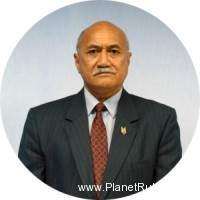Ratu Wiliame Katonivere, President of Fiji (since Nov 12, 2021)
 Ratu Wiliame Maivalili Katonivere (born 20 April 1964) is a Fijian chief and politician who is the president of Fiji since 2021. He has also been the chief of Macuata Province since 2013, succeeding his older brother Aisea Katonivere, and was previously involved in conservation initiatives of Fiji’s Great Sea Reef.
Ratu Wiliame Maivalili Katonivere (born 20 April 1964) is a Fijian chief and politician who is the president of Fiji since 2021. He has also been the chief of Macuata Province since 2013, succeeding his older brother Aisea Katonivere, and was previously involved in conservation initiatives of Fiji’s Great Sea Reef.
Katonivere has been the chairman of the Pine Group of Companies from 2020 to 2021, which includes Fiji Pine Limited, Tropik Wood Industries Limited, and Tropik Wood Products Limited. He is also a board member for Fiji Airports, Fiji Sugar Corporation and Rewa Rice Ltd.
At 19, Katonivere joined the Royal Fiji Military Forces in 1984 and served two tours in the Middle East under the United Nations Interim Force in Lebanon. He was enlisted to the rank of lieutenant colonel and served as a Commanding officer of the 7th Infantry Regiment of the Territorial Forces.
Katonivere was born on 20 April 1964 at the Colonial War Memorial Hospital in Suva to Ratu Soso Katonivere and Samanunu Boteiviwa as the youngest out of seven siblings. He attended Draiba Fijian School before completing his secondary education at Bua College in 1981. Katonivere hails from the village of Naduri, Macuata in Vanua Levu. He is married to Filomena Katonivere and they have two children and three grandchildren.
Source: https://en.wikipedia.org/wiki/Wiliame_Katonivere
Jioji Konrote, Former President of Fiji (elected on Oct 12, 2015)
 Major General Jioji Konousi Konrote, OF, MC, better known as George Konrote (born December 26, 1947), is a Fijian politician and retired Major-General of the Fiji Military who was elected as President of Fiji in October 2015. After commanding a peacekeeping mission in Lebanon, Konrote served as Fiji’s High Commissioner to Australia from 2001 to 2006, as Minister of State for Immigration briefly in 2006, and as Minister for Employment Opportunities, Productivity and Industrial Relations from 2014 to 2015. He will be the first non-indigenous president and the first to be elected by parliament, as previous presidents were selected by the Great Council of Chiefs.
Major General Jioji Konousi Konrote, OF, MC, better known as George Konrote (born December 26, 1947), is a Fijian politician and retired Major-General of the Fiji Military who was elected as President of Fiji in October 2015. After commanding a peacekeeping mission in Lebanon, Konrote served as Fiji’s High Commissioner to Australia from 2001 to 2006, as Minister of State for Immigration briefly in 2006, and as Minister for Employment Opportunities, Productivity and Industrial Relations from 2014 to 2015. He will be the first non-indigenous president and the first to be elected by parliament, as previous presidents were selected by the Great Council of Chiefs.
Konrote is a native of the island of Rotuma. His days as a pupil at Natabua High School in Lautoka, Fiji, are described in the prize-winning book on Fiji Kava in the Blood by Peter Thomson.
A career soldier, Konrote enlisted into the RFMF in 1966 and trained with New Zealand and Australian defence forces, studying at institutions such as the Australian College of Defence and Strategic Studies and the Australian Defence Force Academy in Canberra, Australia, (where he became a Fellow in 1996), and the Kennedy School of Government at Harvard University in 2000.
Rising through the ranks of the Fiji Military, he commanded battalions of Fijian soldiers in their peacekeeping efforts in Lebanon during the Fiji’s UNIFIL campaign, and was subsequently appointed Deputy Force Commander of the UNIFIL operation, and finally the United Nations Assistant Secretary-General and Force Commander in Lebanon. In recognition of his contributions in these fields, Konrote was awarded the UNIFIL Peace Medal (1978), the Military Cross (UK, 1982), the Order of Merit (Italy, 1997), the Order of the Cedar (Lebanon, 1999) and was made an Officer of the Order of Fiji (Military Division) in 1997.
From 2001 to 2006, Konrote served as Fiji’s High Commissioner to Australia. After his appointment, equivalent to that of an ambassador, expired at the end of March 2006, he was elected to represent the Rotuman Communal Constituency in the 2006 election,[3] and he was subsequently appointed as Minister of State for Immigration and Ex-Servicemen in the Cabinet of Laisenia Qarase. His role in this portfolio abruptly ended when the government was deposed in a military coup led by Commodore Frank Bainimarama on 5 December 2006.
Despite serving in the Qarase government, Konrote became a candidate for Bainimarama’s party, FijiFirst, in the 2014 election, winning 1,585 votes. He was subsequently appointed as Minister for Employment Opportunities, Productivity and Industrial Relations in September 2014.
Source: https://en.wikipedia.org/wiki/George_Konrote

